
Nearly 3 years ago, I launched The Talented Learning Show podcast with one mission – to shine a practical light on the tools and techniques that move extended enterprise learning forward. Recently, I took a look back at the nearly 40 interviews we’ve recorded. It was immediately obvious that my guests’ parting words of wisdom have reached critical mass. They deserve to be shared in writing. This is the first post in a series that will showcase the full collection of “best advice” answers. Today, we focus on partner training…
Naturally, as an industry analyst and consultant, I have my own ideas. But this podcast isn’t about me. It’s about the training practitioners, technology innovators and others who are in the trenches every day, making measurable training programs work. That’s why I end each interview by asking my guests to share their best advice about how to succeed with extended enterprise education. Their answers are always fascinating and useful. So with that in mind, I’ve assigned each answer to one of six categories:
- Extended Enterprise Learning
- Learning Strategy and Technology
- Customer Education
- Partner Training
- Continuing Education in Associations
- Commercial Training and Certification
Stay tuned for all the posts in this series
“Best Advice” For Partner Training
From Episode 36:
How Can Organizations Rapidly Deploy B2B2B Certification Programs and Platforms?
Q: Now that you’ve launched a revenue-based certification program that targets your organization’s partners, let’s fast-forward 2-3 years. What metrics will tell you if this was successful?
A: Ha Nguyen McNeill – COO at BSA | The Software Alliance
Well, I would consider at least three types of success metrics:
1) Sales results are obviously important.
2) Reseller performance is also really important, because that is the crux of our strategy. In other words, we could be trying to market this directly. But working with and through the ecosystem of organizations that are in the same space is a reinforcing mechanism.
We all understand why this is important, and everyone has an interest in helping one another push the message out.
3) In addition, I would look at automation and data. In switching learning platforms, one of our big considerations was how much we could automate.
How can we minimize the backend administrative human burden? And how well are we driving marketing, growth and overall strategy based on the data we’re able to get from reporting that’s available in the platform?
We’ll want to see progress here.
From Episode 5:
What Can a Modern LMS Do for Global Franchise Training?
Q: What would you say to organizations that are launching franchise partner training?
A: Christine Shanks, LMS Administrator at Dairy Queen
Keep these two things in mind:
1) There are many factors involved with a franchise LMS, and understanding all those factors is essential. For us, including DQ franchisees in the LMS replacement process was very important.
That’s why we created a focus group for our pilot program. And we continue to work with this group, because we’re not perfect yet.
Actually, that’s my other piece of advice.
2) A training program is never really done. At least for us, it isn’t. Our LMS has been live for a year and a half, but it isn’t finished, and it will never be complete. That’s what I tell our franchisees, as well as our internal staff.
This is really a continuous improvement process. There’s always something that can be adjusted, expanded or enhanced. We get feedback and ideas from franchisees all the time. They are not afraid to email us and tell us how they feel. And of course, we want to try to help. So we evaluate their requests, and then make desired changes on a regular basis.
That’s why we gathered input from our franchise partners from the start. And we will continue to seek their input. We call it an evolution.
It’s our job to evolve and adapt the program in a way that helps franchisees meet their objectives, while keeping in mind that we want to put out the best training we can to support DQ brand objectives.
There are definitely training strategies we need to keep in mind, but ultimately, we’re here to help franchisees succeed.
From Episode 6:
How Does Training Adoption Affect Franchise Performance?
Q: Do you have any parting advice for organizations that want to get started or improve franchise training so it’s more effective?
A: Trista Kimber, Director of Training and Design at Hooters
Absolutely. One of the most important things a franchise organization can do is listen closely to franchisees. Find out what they truly want that will help improve their business performance.
If they’re not using a training program, or if it seems like something isn’t working, investigate and find out why. Maybe it’s not applicable in some areas. Or maybe adoption isn’t feasible within their budget. Or maybe there’s some other reason you haven’t considered.
So don’t hesitate to talk openly with partners. Find out what you need to know.
If franchisees feel they’ve had a say in what you’re doing, they’ll be much more willing to jump onboard and take ownership when you roll-out something new – whether that’s a training program, a menu item or a brand-related change.
That’s the most important piece of advice I could share with anyone. Talk regularly with your partners. Spend time with them and find out what’s going on in their world. Host roundtables. Ask for their opinions and ideas.
Some franchisees may even have systems or content that would make sense to roll-out on a corporate level. But you won’t know unless you spend time getting to know what’s happening in those organizations.
From Episode 9:
How Are Associations Driving New Training Revenues?
Q: Many associations offer continuing education directly to members. But selling that content through business partners can be much more complex. What should associations know before moving in that direction?
A: Linda Bowers, CTO at WBT Systems
Before your association starts selling content to partners, you’ll want to get a very clear picture of what you’re trying to accomplish from a business perspective, and what kind of model best fits your goals.
If you try to fill every gap, you could end up with too many offerings. Instead, identify one or two approaches that make the most sense for your situation.
For example, it may be best to offer specific content bundles or sell individual courses, as needed. Just be sure you specify a service model that is relevant for the audiences your partner serves and other business realities.
Obviously, this can evolve over time. But initially, if your organization focuses on how to package and deliver content in a way that partners will value, that’s a good starting point.
Then everything else falls into place. Think about how you manage the contract. Is it in the AMS or CRM? Is it in the LMS or self-serve? All of these things naturally flow out of that first, fundamental business decision.
From Episode 25:
How Do Channel Training Networks Drive Revenues?
Q: What should learning professionals know when they’re starting to think about offering training to distributors, resellers or channel sales teams?
A: Doug Gastich, former President of BlueVolt:
About a year ago, I joined a gym. I’ve never worked out consistently, mostly because I lacked motivation. But also, I didn’t know how to make the most of a workout, so going to a gym and not knowing what to do was much worse than not going at all.
Anyway, I was introduced to a circuit gym with a coaching staff, and they’re fantastic. Now I actually look forward to working out, which is astounding.
My point is that it’s important to find a coach who can guide you and keep you accountable. They’ll make sure you do it, and do it right.
And here’s proof from my life. Recently, my gym had to close temporarily. They gave us all kinds of home workout routines. But do you think I’ve worked out? Do you think I’ve done even one push up this week? No.
The upshot is that if you want to get partners involved in training, find someone who can help you do it. Then, before you begin, plan your roadmap.
Start backwards. Think about defining your most important learner audiences. Who are they? Maybe you need to educate people in a specific role at a dealer organization. Maybe you need to reach multiple types of employees, or others in your distribution channel. Whatever your target, define those audiences very specifically.
We offer a tool called the Channel Learning Canvas that helps people walk through this process. But you don’t need to use that tool. Just start by putting it down on paper. This clarifies your priorities.
Next, specify what you want each group to learn so their organization’s performance will improve. Then work all the way back to the beginning.
So, even before you think about what courses to offer or about what learning platform you need, just think about who your learners are and what would be beneficial to your business if you helped them do something differently.
Do they need more knowledge or competency to change their behavior? What can you do to guide them through that behavioral change?
Get a coach to help you answer that question, and you’re on your way. In fact, you’ll be far ahead of many organizations that offer partner training, but haven’t thought carefully about who they serve and why.
Need LMS Selection Help?
You are not alone! Check out our LMS Buyer Services or/and fill out the form below to schedule an initial consultation:
Share This Post
Related Posts
The Future of Customer Education: Customer Ed Nugget 16
Customer education is rapidly evolving as organizations embrace new strategies and tech. What does this mean for the future of customer education? See what experts say on this Customer Ed Nuggets episode
Education Strategy Mistakes to Avoid: Customer Ed Nugget 15
What does it take to deliver a successful customer education program? It starts with a solid education strategy. Learn how to avoid common pitfalls on this Customer Ed Nuggets episode
Which LMS is Best for You? New Shortlisting Tool for 2024
How can you find the best learning system for your business? Our LMS shortlisting tool can help. Learn about the 2024 RightFit Solution Grid. Free, reliable guidance based on our independent research
How to Build a Learning-Based Business: Executive Q&A Notes
Building and selling online courses may seem easy, but building a profitable learning-based business is far more complex. Find out what successful leaders say about running this kind of business
The Rewards of Community Building: Customer Ed Nugget 14
What role does community play in your customer relationships? Find out why community building is such a powerful force in customer education on this Customer Ed Nuggets episode
Benefits of Training Content Syndication: Customer Ed Nugget 13
If you educate customers online, why should you consider content syndication? Discover 10 compelling business benefits in this Customer Ed Nuggets episode
Top Marketing Skills to Master: Customer Ed Nugget 12
Successful customer education programs depend on professionals with expertise in multiple disciplines. Which marketing skills lead to the best results?
How to Measure and Improve Partner Training ROI
An educated channel is a successful channel. But how do you know if your educational programs are effective? Learn from an expert how to evaluate partner training ROI
Mistakes in Ongoing Customer Training: Customer Ed Nugget 11
Customer education doesn't stop with onboarding. It pays to invest in ongoing customer training. Learn which mistakes to avoid in this Customer Ed Nuggets episode

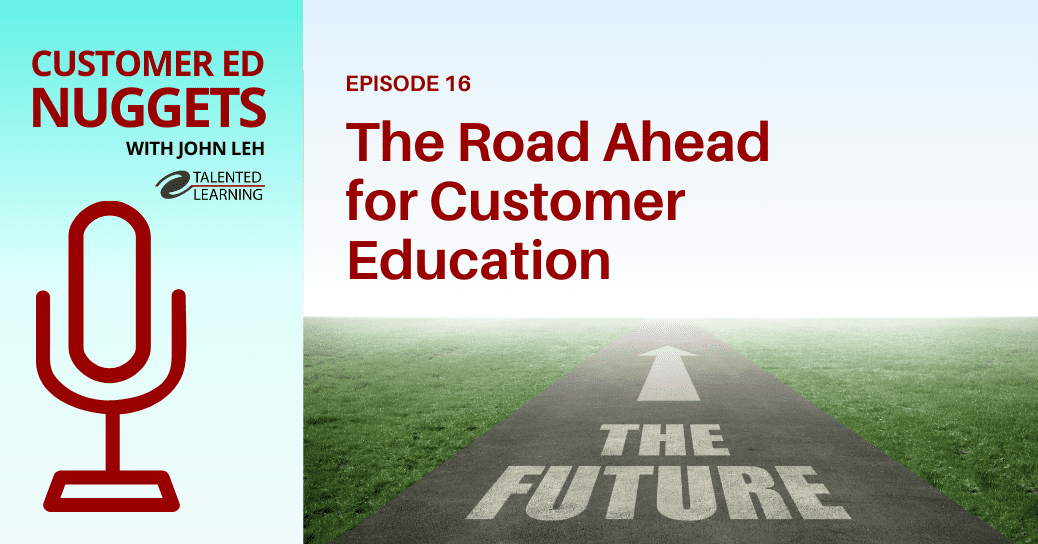

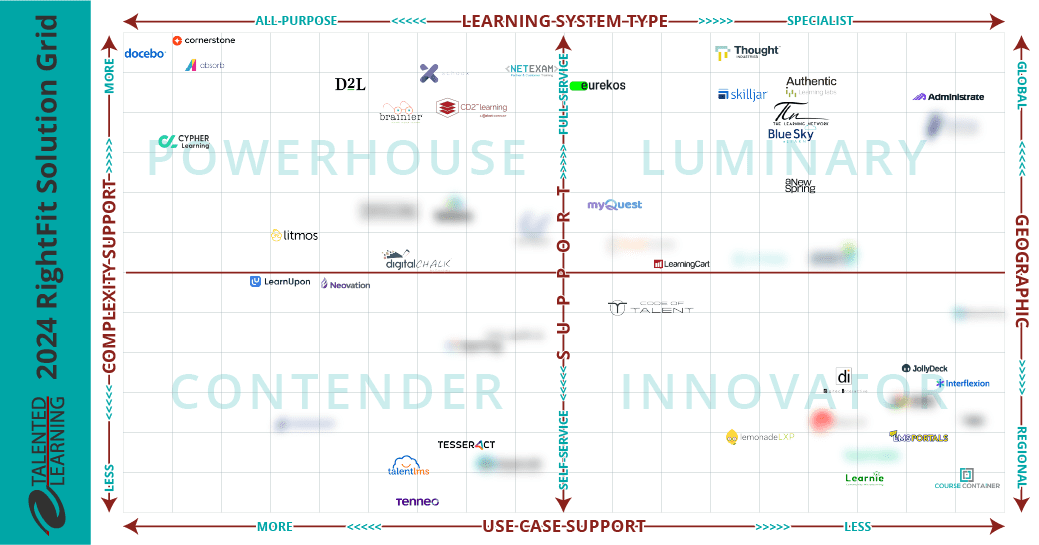


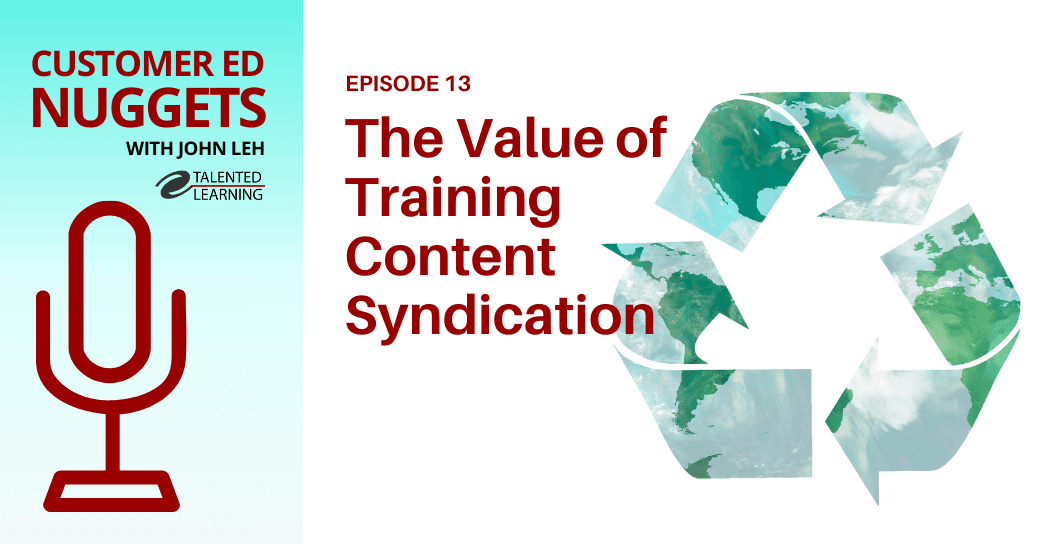


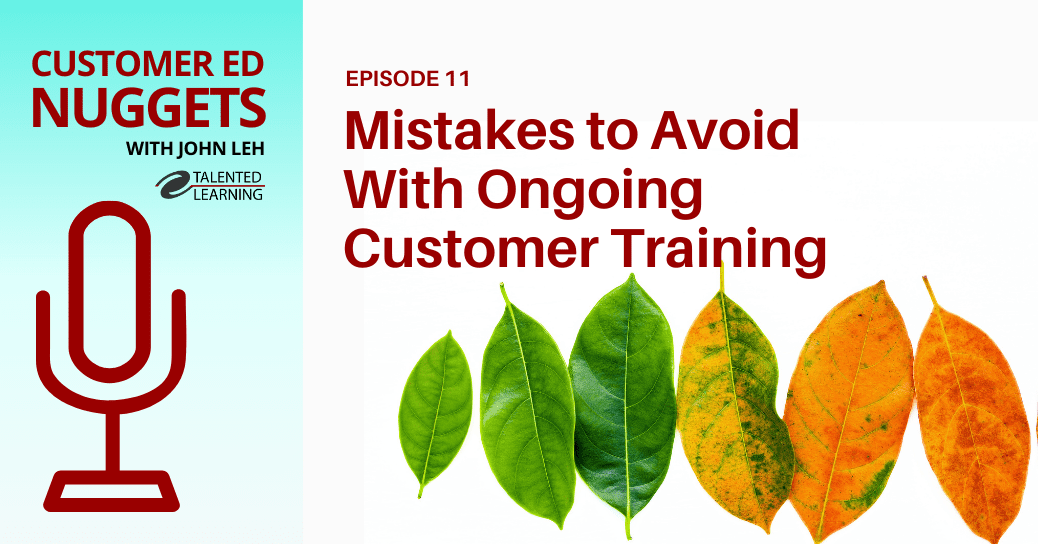

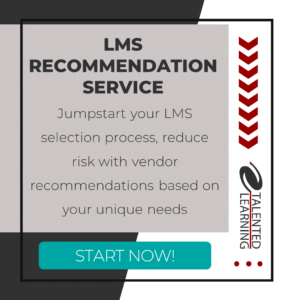


FOLLOW US ON SOCIAL